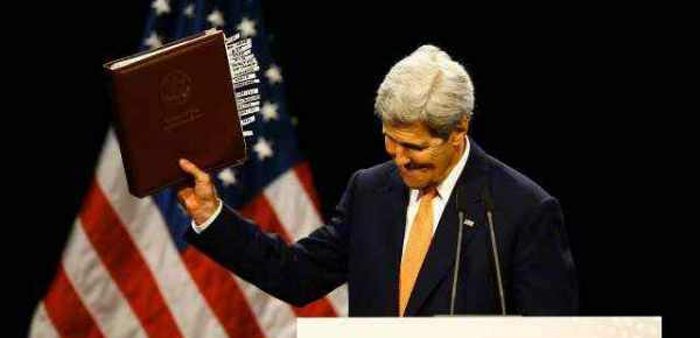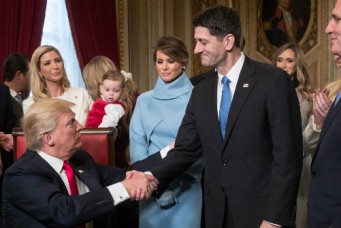Will Congress Snatch Defeat from the Jaws of Victory?
Congress will have a sixty-day review period–until September 17–in which it can accept the deal, reject it, or do nothing. The White House has a fight on its hands, but one that it can win.

U.S. Secretary of State John Kerry officially announcing the conclusion of an Iran deal at the Vienna International Center, Vienna, Austria, on June 14, 2015. Leonhard Foeger/Reuters/Corbis.
It’s not often that you get to witness history being made. Even more rare: Watching the process of history unfold. Over the past two years, I’ve had the good fortune of experiencing both. After attending nearly every round of nuclear negotiations between the P5+1 and Iran since 2013, I watched U.S. Secretary of State John Kerry and Iranian Foreign Minister Javad Zarif accomplish in Vienna what conventional wisdom said was impossible. But living in Washington DC for ten years can make you paranoid: As I watched Secretary Kerry discuss the comprehensive nuclear deal at the Vienna International Center, I couldn’t help but focus on a huge challenge waiting for him at home. We should be clear-eyed about the fact that some members of Congress will spare no effort to kill this deal.
It was arguably the worst kept secret in Washington that some in Congress would reject any deal that American negotiators brought home. And while it is understandable to draw an equivalency between perceived obstacles in Washington and Tehran, the reality is that Tehran has cleared the way for successful implementation – if Washington follows through on its end of the bargain. In Iran, parliament recently passed legislation that ceded its authority to accept or reject the deal to Iran’s Supreme National Security Council (SNSC). Most key SNSC members – including Khamenei himself – are on the record supporting a deal, so there are fewer domestic political complications in Tehran compared to what the White House now faces in Washington.
Looking ahead, Congress will have a sixty-day review period–until September 17–in which it can accept the deal, reject it, or do nothing. After that, there will be a maximum of twenty-two days in which President Obama can veto congressional rejection if necessary, and Congress can then try to override Obama’s veto. Right now, successful Congressional sabotage will be an uphill battle, but they can still turn things around. A Senate staffer painted a clear picture of what lies ahead: “AIPAC [the American Israeli Public Affairs Committee] went to [Israeli Prime Minister] Netanyahu and told him point blank, ‘We don’t have the votes.’ Netanyahu’s response? ‘Do it anyway.’”
Thus, it should be clear that the White House has a fight on its hands. Another Senate staffer said last week that in the immediate aftermath of the nuclear deal being announced, his office was getting calls at a ratio of 10-1 against the deal, almost entirely from supporters of pro-Israel groups trying to kill diplomacy. They are a small minority compared to the overwhelming number of Americans who support the deal, but they are more organized, better funded, and ideologically rigid–a powerful combination in American politics that cannot be discounted.
However, their efforts will not go unchallenged because President Obama holds a powerful trump card. Unlike his opponents who make hollow arguments about American weakness and Iranian hegemony, Obama can try to win this fight the same way he won the battle over ObamaCare: Using universally respected, bipartisan validators–military, intelligence, political, and civil society–to appeal to America’s national interests rather than the personal political interests of individual members of Congress. The Obama administration has already embarked on a media blitz, and its outreach efforts to Capitol Hill thus far range from public testimony to private rounds of golf with the President himself. Supporters of the deal within American civil society are also not taking this fight lightly. Rather than sit passively, they are taking steps to fight fire with fire: Organizing their own lobbying efforts, phone calls to Congress, and media outreach, among other initiatives.
Obama can also remind members of Congress that it would be unwise to turn their back on the international community: If Congress vetoes the deal, it would be putting America in noncompliance with an agreement made not just with Iran, but also five other global powers. That will allow Iranian officials to say the problem lies in Washington rather than Tehran, as well as restart various aspects of their nuclear program with little international unity against such actions. The U.S. would find itself in a Bush administration redux–having no good options because its own policies eliminated all of them. By making this comprehensive case together with the aforementioned validators, Obama can increase the likelihood that he can peel off enough fence-sitting senators to resist the inevitable pressure that comes with being in the crosshairs of powerful pro-Israel lobby groups who are opposed to the deal.
Perversely, the nuclear deal has another parallel with ObamaCare: the initial effort by Congress to torpedo it will not be its last. Rather than graciously accept defeat and bow to popular will, hawks in Congress will introduce and try to pass a variety of legislation that kills the deal by blocking various aspects of American implementation–death by a thousand paper cuts rather than with a shotgun. 171 House Republicans already introduced such legislation before the White House even submitted the deal to Congress for review. However, just like the fight over ObamaCare, the hawks have no easy path to the numbers required to kill it in Congress, the Supreme Court likely won’t overturn it, and future presidents are unlikely to create unnecessary crises for themselves by tampering with success. The vote count in Congress might be close, but as things stand today, Obama’s signature foreign policy achievement should survive. The White House and its supporters are playing this game wisely: They understand that premature celebration could produce inadvertent defeat.
As Washington and Tehran carry out the various steps to implement this deal, there is no doubt that the path will be fraught with complications. On the technical side, the joint dispute resolution process that was created as part of the deal will be critical to resolving issues that may arise, big or small. On the political side, a variety of volatile security issues in the Middle East have the potential to blow up in their respective faces–literally and figuratively. The reality, however, is that neither side wants this deal to fail. The political investment they have made is massive and unprecedented, and the U.S. government now openly acknowledges that the consequence of failure is war. For these reasons–and despite the best efforts of some in Congress–the nuclear deal increasingly looks like the banks in 2008: Too big to fail.
Reza Marashi is research director at the National Iranian American Council in Washington, DC. He previously served in the Office of Iranian Affairs at the U.S. Department of State. His articles have appeared in the New York Times, Foreign Policy, Atlantic, and National Interest. On Twitter:@rezamarashi.




